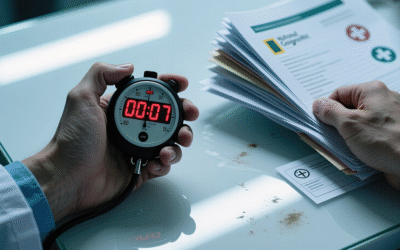Dr. Philp McMillan, John McMillan
“You may think you want the truth, but the reality is that you can’t handle the truth.” This isn’t a line from a courtroom drama; it effectively summarizes the stance UK courts took when denying Dr. Clare Craig’s request for basic anonymized vaccine death data. Her request was straightforward: three data points, stripped of identifying information, to help answer questions about post-vaccination mortality patterns. Instead, she encountered institutional obstruction, secret tribunal proceedings, and justifications that would be laughable if the stakes weren’t so high.
The Unlikely Rebel and Her Simple Request
Dr. Clare Craig never intended to be a troublemaker. Born into a medical family, she chose pathology for its scientific foundation. “If you can’t get the diagnosis right, then you’re on the wrong track from the beginning,” she explains. By her own admission, “I was head girl at school. I am not a rule breaker.”
By summer 2020, as a testing expert, Craig noticed that COVID case and death counts remained strangely constant despite the wave having passed. Her analysis revealed that summer “COVID” deaths were statistically different from spring deaths – different demographics, different time-to-death patterns. People were dying after random positive tests rather than from COVID itself.
When she went public, the medical community attacked her. Working outside the NHS granted her a freedom that most doctors lack: the ability to speak without career consequences. She co-founded the Health Advisory & Recovery Team (HART), a group raising concerns about pandemic policies.
Then came the Japanese data. Citizens there obtained vaccination and death timeline information, revealing mortality peaks at 90-120 days post-vaccination. Researchers in other countries sought to verify or refute it. Craig requested the UK equivalent:
- Age at first vaccine dose (in 10-year bands)
- Date of each vaccine dose (anonymized)
- Date of death (anonymized)
This request was limited to individuals over 20, with no names, locations, medical records, or causes of death included. Standard anonymization would apply, adding or subtracting a random number between minus three and plus three days to each date, a technique routinely used for living patients.
The irony is that this exact data had already been shared with pharmaceutical companies for safety reporting.
The Shifting Justifications
The UK Health Security Agency (UKHSA) refused. Their justifications evolved like a virus escaping immune pressure.
First excuse: Anonymizing dates would constitute “creating new data,” which they weren’t required to do under Freedom of Information legislation—ignoring that Craig’s proposed technique was standard practice.
The Information Commissioner’s Office (ICO) initially agreed, supporting Craig’s request with case law. She thought the matter was settled. She was naively optimistic.
After UKHSA responded, the ICO performed a complete turnaround, claiming that release would “endanger the mental health of bereaved families” and “fuel misinformation.” The pattern suggests someone higher up intervened.
UKHSA’s argument: “There is a real and present risk that data will be presented out of context by anti-vaccine proponents, which could undermine public adherence to current and future COVID-19 vaccination programs.”
The argument wasn’t that the data would be false, but that it might be presented “out of context” by those with opposing views. If the science cannot withstand scrutiny from critics, how robust is it? When did “trust the science” become “trust us to decide what science you’re allowed to see”?
Craig’s perspective as a pathologist is instructive. Pathology serves as medicine’s audit function. Postmortems verify diagnoses, catch mistakes, and provide feedback. But this culture has declined dramatically, and the vaccine data battle continues that trend. Without examining what happened, medicine operates blindly.
The Secret Tribunal
Craig took the UKHSA to court. Three additional bodies joined to oppose the release: the ICO, NHS England, and the Office for National Statistics (ONS). Enter Vahe Nefarian from the ONS, who became pivotal to the tribunal’s decision.
Portions of the hearing were conducted behind closed doors. “The tribunal heard submissions regarding the risk of re-identifying deceased individuals in private,” Craig explained. “We couldn’t argue about how that was accomplished, which was pivotal to the decision.”
The tribunal’s decision relied on evidence Craig never saw, methodology she couldn’t challenge, presented by a witness she couldn’t cross-examine.
Nefarian argued he could triangulate newspaper obituaries against the anonymized data. He showed the judge that one newspaper report could supposedly match a database entry.
The logical flaws are glaring. First, if you identify someone because you already know their death date from a newspaper, what have you learned? The newspaper already published more identifying information than the dataset would contain. Second, the ONS itself publishes weekly data on age group and region for every COVID death. If re-identification is such a concern, why is that acceptable? Third, Craig requested 10-year age bands. With 50-60 deaths weekly among people in their twenties alone, matching a specific obituary to a database entry would be nearly impossible unless Nefarian used single-year age groups—but because the discussion was secret, we don’t know what he showed the judge.
This wasn’t Nefarian’s first appearance. During judicial review proceedings about vaccinating primary school children, the ONS admitted to a “statistically significant rise in deaths” among teenage boys in 2021. The court refused to release anonymized time-from-vaccination-to-death data for these 300 boys.
The Liability Question
What explains the fierce resistance to releasing data already shared with pharmaceutical companies and released safely by other countries?
Follow the liability trail. At every level—industry, government, medical institutions, entities that promoted vaccines as “safe and effective” mandated them. Healthcare workers who had been frontline heroes in 2020 were threatened with job loss. Care home workers – 40,000 of them – were dismissed in autumn 2021.
If people were harmed, potential liability is staggering. Everyone faces an untenable situation: If they saw problems, why weren’t flags raised? If they didn’t see problems, why weren’t studies conducted?
Craig’s assessment: “I think they know what is coming… I suspect they probably know that if it were released, it would be chaos. This would be an absolute disaster for the reputation of multiple sectors.”
The pattern extends internationally. In New Zealand, a database manager was prosecuted for releasing concerning vaccination and death data. The data was suppressed. No investigation followed. The message: releasing this data will destroy you.
The Absurd Final Arguments
The tribunal rejected “misinformation” as legal grounds, stating: “To have reached a conclusion on misinformation, we would have needed specific evidence, and that evidence was not available.”
They upheld refusal on two grounds, both absurd:
Mental Health Endangerment: Based on Nefarian’s “unevidenced assertion” that some might feel distressed if contacted about the data. Section 38 of the Freedom of Information Act means one person’s potential adverse reaction to an anonymized spreadsheet sufficed to block release. No specific evidence was required.
Time and Cost: UKHSA claimed 76 years were needed, 10 minutes per entry to verify against press reports. Yet UKHSA had already generated this dataset for pharmaceutical companies and for the judge. Craig’s question: “If the dataset already existed for those purposes, why couldn’t it be provided under the FOI?”
International Proof of Concept
The Czech Republic released more granular anonymized vaccination and death data than Craig requested. The result? No harm, no misuse, no privacy breaches. This proves that anonymized release is technically feasible and safe. The UK’s stance is an outlier. If the Czech Republic can release more detailed data without incident, what is the UK hiding?
Healthcare workers were heroes in 2020. Yet trust has been “decimated post-2020 into 2021 and onwards largely because medicine didn’t continue to advocate for the people whose lives had been saved and served.” A JAMA study found trust in doctors fell 30% between 2020 and 2024. The medical profession gained little; funding went to pharmaceutical companies. What doctors lost: reputation, trust, and moral authority.
They remained silent when care home workers were fired, when mandates threatened colleagues, and when patients raised legitimate questions.
Craig’s journey illustrates why so few doctors spoke up. “Most doctors are dependent on their NHS careers and, as such, are silenced by it.” Career stability, institutional pressure, and a culture discouraging questions combined to create a profession unable to advocate for patients when it mattered most.
“If you just throw it away because of fear or your love of career, then what do you become?” Craig asks. “What is medicine without ethics?”
She continues to speak out out of a sense of responsibility: “I would not sleep at night if I wasn’t saying this because it’s important, and I care more about the impact on the public and the fact that the public isn’t being told the truth. I think the truth really matters, and I want my children to grow up in a world where it can still be spoken, and that only happens if we speak it.”
Craig’s legal advice is clear: there is no realistic prospect of obtaining this data through further appeals. The legal road is exhausted. The data will remain hidden, shared with pharmaceutical companies but not independent researchers or the public.
In her final statement, Craig offers no grand conclusions: “I want to thank you again for your support. We brought the case in good faith, we followed the process, and we reached the end of this particular legal road. I will leave the facts with you, and each of us can reflect on what they mean for transparency, evidence, and public trust.”
The facts are clear. A pathologist requested three anonymized data points. The data existed, shared with pharmaceutical companies, generated for the judge, and used by authorities. International precedent proved such data could be released safely. Yet the UK establishment fought with secret evidence, shifting justifications, and arguments that collapsed under scrutiny.
The only question is why. The most likely answer, that the data would reveal patterns authorities don’t want examined, should concern us the most.
“You can’t handle the truth” wasn’t a warning. It was a decision made for us by those who’ve determined transparency is too dangerous for public health. The cost of that decision, paid in lost trust and unanswered questions, is only beginning to come due.




In my opinion having said all that. People are still dying. But nobody wants to understand and respect the Truth. Please read between the lines. ….. There is lots more to be said. Then again ……….